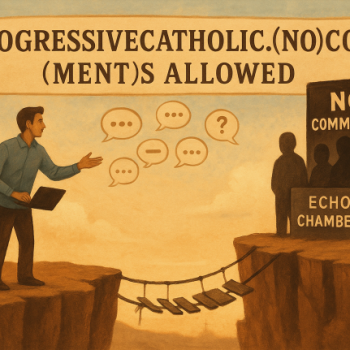GODSTUFF:
LIGHTEN UP AND ENJOY THE LAMPOON, O YE FAITHFUL
Full disclosure: I’m a rabid “South Park” fan.
It’s sort of the televisual equivalent of a handful of Sour Patch Kids, those chewy candies covered in a powdery substance and so dang sour that they make your cheeks contract in the middle like a goldfish. You can’t stop eating them even though they make you wince.
The biting, often maddeningly smart social commentary that “South Park” creators Trey Parker and Matt Stone weave into otherwise sophomoric dooky-humored plot lines is brilliantly subversive.
At least, that’s what I call after my husband, as he flees the room any time I turn on Comedy Central to find the precocious/sociopathic gradeschoolers Stan, Kyle, Kenny and Cartman in the midst of another bleep-laden adventure.
If it’s on, I can’t not watch it. I should probably seek help, I realize, perhaps from a support group such as Inappropriately Humored Religion Reporters Anonymous (Its awkward acronym is pronounced “Ira.”)
So you’ll forgive me for not being perhaps more appropriately sympathetic toward the very public and controversial stand soul music legend Isaac Hayes took this week when he quit his job as the voice of the character Chef on “South Park” because it apparently offended his spiritual sensibilities.
Hayes is reportedly a longtime, devout member of the Church of Scientology. He asked to be released from his “South Park” contract because of what he described as a “growing insensitivity toward personal spiritual belief.”
“There is a place in this world for religious satire, but there is a time when satire ends and intolerance and bigotry toward religious beliefs . . . begins,” Hayes said in a statement to the Associated Press.
While he didn’t mention it specifically, most of us assume Hayes’ ire was raised by an episode of “South Park” aired last November that took comic liberties with Scientology. In the episode titled “Trapped in the Closet,” the character Stan is told by Scientology leaders that he is the reincarnation of the church’s founder, L. Ron Hubbard. A cartoon version of Tom Cruise, perhaps Scientology’s best-known disciple, locks himself in a closet and refuses to come out after Stan tells him his acting is just “OK.” (There’s another layer to Stone and Parker’s social commentary therein, but that’s an entirely different column.)
See, here’s the thing: “South Park’s” bread-and-butter is its no-holds-barred, equal-opportunity-offender approach to religion and other social institutions. Christian. Jewish. Buddhist. Hindu. Catholic. Protestant. Mormon. Any and all organized religion is fair game.
The show has alternately depicted Muhammad as a Muslim superhero, the Lord Krishna as a beaver that tries to kill Abraham Lincoln, and a boxing match between Jesus and Satan (who, by the way, is also portrayed as Saddam Hussein’s overly-sensitive gay lover.)
Hayes has been a part of the “South Park” cast — lending his velvet bass to the school cook, Jerome “Chef” McElroy — since 1997. Parker told the AP he’d “never heard a peep out of Isaac in any way until we did Scientology. . . . He got a sudden case of religious sensitivity when it was his religion featured on the show.”
I can understand why Hayes would be defensive of his chosen spiritual path. People call Scientologists wackos. Cruise has become the butt of a million jokes because of his aggressive proselytizing on the church’s behalf. Church members feel under siege, and in some ways they are.
If Hayes feels the need to defend his church, fine. Why he waited four months to do it is a bit curious, but I won’t deride the man for his beliefs. And as I wrote last week, blasphemy is in the eye of the beholder.
Hayes has said he’s a Christian by tradition, but Scientology is a kind of spiritual technology that helps him live his life in a better way. I’m down with that. Whatever helps you be a healthier, kinder, more loving person is cool with me, even if what you believe seems strange.
How much stranger, really, is it to believe (as Scientologists do) that humans are actually intergalactic eternal beings called “thetans” who have lived for trillions of years, than it is to believe that bread and wine turn into Jesus Christ’s flesh and blood when the eucharistic wafer is consecrated? Or that God spoke to Moses through a burning bush, dispatched an angel to Earth to literally kick Jacob’s butt, and required his chosen people to remove the foreskins of all their menfolk?
Most of the world’s religions were at some point in their history considered a wacky cult. Once upon a time, plenty of people thought Lutherans were pretty woo-hoo. Even dangerous. A theology professor of mine once explained that the difference between a cult and a religion was about 100 years.
But I don’t think that’s really what this “South Park” flap is all about. It’s not about whose religion is right, or wrong, or weird, or normal. It’s not about whether the Church of Scientology pressured Hayes into quitting, or whether Parker and Stone have finally gone too far.
It’s essentially about how we humans define ourselves and what happens when we feel like the very compass by which we orient our lives is attacked.
Religious satire is hilarious until it sits down in the pew next to us and makes us, our God or our beliefs the punchline, right?
What “South Park” does is make fun. It’s a provocative, obnoxious, and totally politically incorrect cartoon. I’ve always thought Parker and Stone’s point was that we all take ourselves too seriously — artistically, politically, ethnically, spiritually — and that we all might be better off if we loosened our death grip on our individual corners of the ultimate truth.
It reminds me of something the absolutely irreverent politically incorrect author and self-described “cosmic lounge lizard” Tom Robbins told me last summer:
“We live in hell because we take ourselves too seriously.”
Cartoons aren’t dangerous.
But people who take cartoons too seriously can be.
The world would be a much safer, more peaceful place if we’d all learn to lighten up a bit.
Copyright © The Sun-Times Company
All rights reserved. This material may not be published, broadcast, rewritten, or redistributed.















